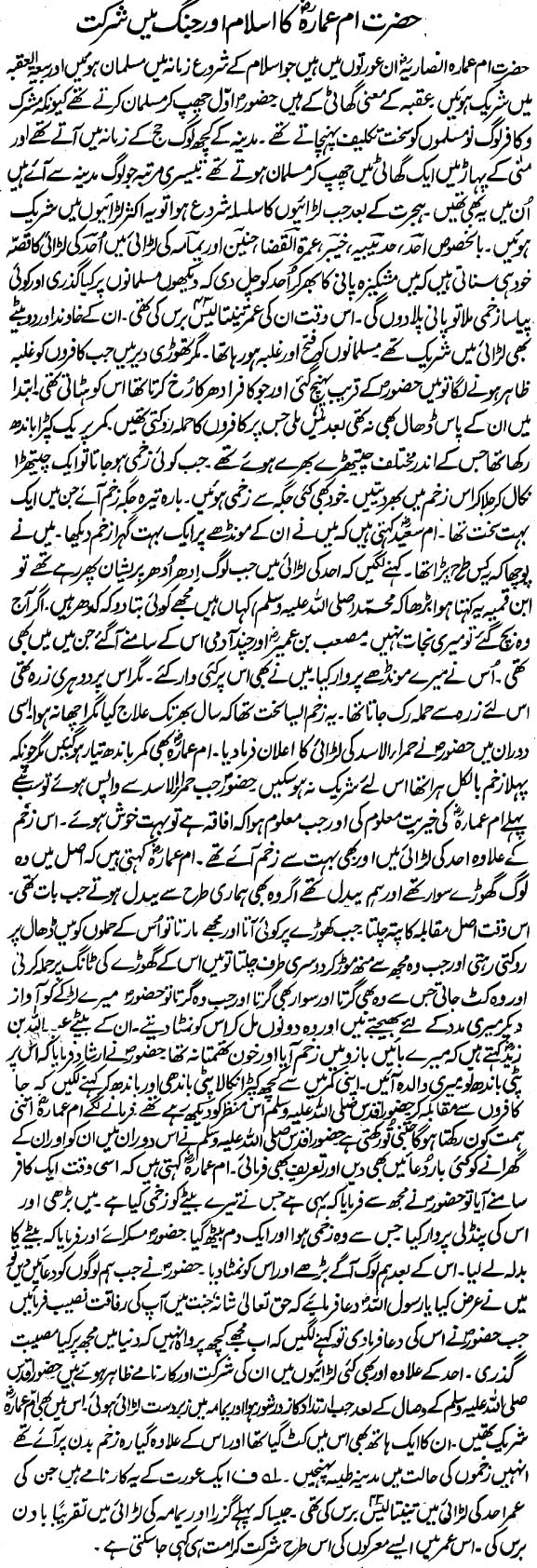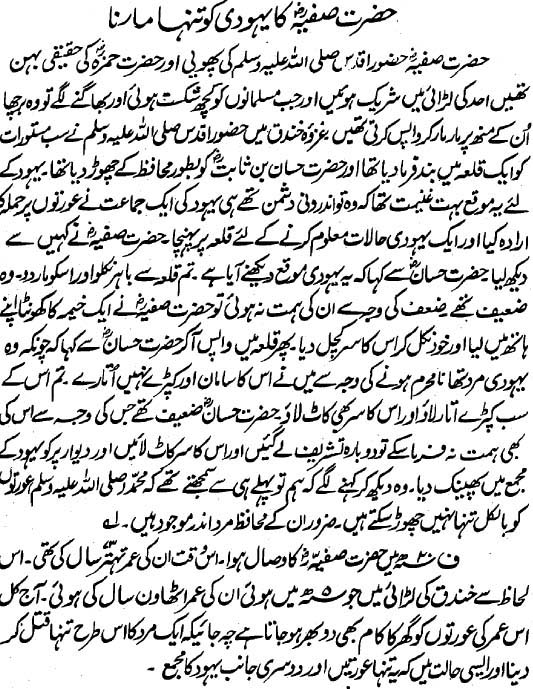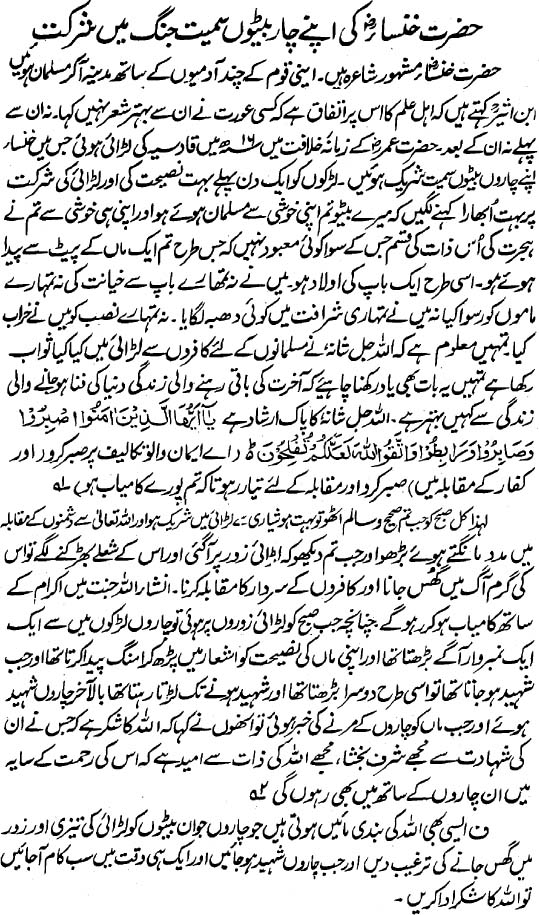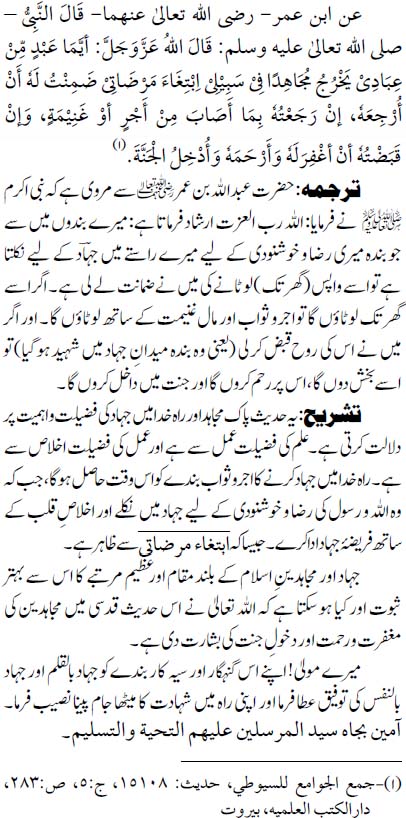
Hazrat Umm Amarah RA Ka Islam Aur Jang Mein Shirkat
TAG: Jihad
Hazrat Safia RA Ka Yahoodi Ko Tanha Marna

Hazrat Safia RA Ka Yahoodi Ko Tanha Marna
Al-Khansa RA Ki Apne Charo Betoon Kay Sath Jang Mein Shirkat

Al-Khansa RA Ki Apne Charo Betoon Kay Sath Jang Mein Shirkat
Umm Haram RA Ki Ghazwa Behar Mein Shirkat Ki Tamanna

Umm Haram RA Ki Ghazwa Behar Mein Shirkat Ki Tamanna
Umm Ziyad RA Ki Chand Aurton Kay Sath Khyber Mein Shirkat

Umm Ziyad RA Ki Chand Aurton Kay Sath Khyber Mein Shirkat
10 Hadiths About Hajj
Today, we witness the beginning of the rituals of Hajj. Millions of Muslims are gathering in Makkah and the sacred places to respond to Allah’s invitation to visit His House; an invitation announced by Prophet Ibrahim and then renewed by Prophet Muhammad (peace and blessings be on them).
In the following lines, we explore some of the Prophet’s hadiths related to Hajj that reveal the significance of this great worship and how pilgrims are received and perceived by Allah the Almighty.
A Pillar of Islam
Among the numerous and diverse rituals of Islam, Hajj is a main component; it is an indispensable pillar of Islam:
1. Abdullah ibn Umar (may Allah be pleased with him) quoted the Prophet (peace and blessings be upon him) as saying: “Islam has been built on five [pillars]: testifying that there is no god but Allah and that Muhammed is the Messenger of Allah, performing the prayers, paying the zakah, making the pilgrimage to the House, and fasting in Ramadan.” (Al-Bukhari and Muslim)
Once in a Lifetime
Despite the great significance of Hajj, it is sufficient to do it only one time in your whole life. Islam is easy and takes into consideration the burdens and difficulties that pilgrims go through:
2. Abu Hurayrah (may Allah be pleased with him) narrated that one day the Prophet (peace and blessings be upon him) addressed people saying: “O people! Allah has prescribed Hajj upon you, so perform it.” A man asked, ‘Every year, O Messenger of Allah?’ The Prophet (peace and blessings be upon him) kept silent. When the man repeated his question thrice, the Prophet (peace and blessings be upon him) said: “Had I answered in the affirmative, it would have become a (yearly) obligation, and this would have been beyond your capacity.”
Then he added:
“Leave me alone so long as I leave you alone (i.e. do not ask questions about things I didn’t mention). What caused the destruction of the people before you was that they used to ask so many questions, and disagree with their Prophets. So when I command you to do something, do it to the extent of your ability, and if I forbid you from doing something, avoid it.” (Muslim)
A Special Rank and Value
The Companions were keen to know the best deeds so that they could prioritize their good actions according to their values. In the following hadith, the Prophet (peace and blessings be upon him) highlights the special position of Hajj:
3. Abu Hurayrah (may Allah be pleased with him) narrated that the Prophet was asked, “Which deed is the best?”
The Prophet said, “Belief in Allah and His Messenger.”
He was asked again, “What is next?”
The Prophet said, “Jihad [striving] in the cause of Allah.”
He was further asked, “And what is next?”
He said, “Hajj mabroor [i.e. Hajj accepted by Almighty Allah]” (Al-Bukhari and Muslim).
Jihad without Conflict
Going through the difficulties of travel and crowd, the physical effort excreted while doing the different rituals of Hajj, the movement from one place to another, and the sacrifice of money and time all make Hajj a form of Jihad. The Prophet (peace and blessings be upon him) recommended it for women and for weak men who are unable to participate in Jihad on the battlefield:
- A’ishah (may Allah be pleased with her) asked the Prophet, “As jihad is the best deed, shouldn’t we [women] make jihad?”
The Prophet replied, “The best jihad for you [women] is a Hajj mabroor.”
A’ishah later said, “I have been keen to regularly perform Hajj since I heard that from the Messenger of Allah” (Al-Bukhari and Muslim). -
Al-Husain ibn Ali ibn Abi Talib (may Allah be pleased with him) narrated that a man came to the Prophet (peace and blessings be upon him) saying that he was weak and cowardly. The Prophet told him to participate in a type of Jihad that does not involve any fight, namely, Hajj. (Authenticated by Al-Albani)
Generous Reward for Ethical Pilgrim
The following hadith highlights two things:
a. Hajj is a training course for Muslims on sticking to the highest manners whatever the circumstances are,
b. and Hajj is an effective means to erase your sin records:
6. Abu Hurairah (may Allah be pleased with him) narrated that he heard the Prophet (peace and blessings be upon him) say, “Whoever performs Hajj and does not commit any obscenity or transgression shall return [free from sins] as he was on the day his mother gave birth to him.” (Al-Bukhari)
The Ultimate Success
In one Qur’anic verse (Aal-Imran 3:185), Allah tells us that getting protected from hell fire and being admitted to the Jannh is the real success. That is exactly what Hajj earns you:
7. Abu Hurairah (may Allah be pleased with him) reported that the Prophet (peace and blessings be upon him) said,
“The reward for a Hajj mabroor is nothing but Paradise” (Al-Bukhari and Muslim).
- A’ishah (may Allah be pleased with her) narrated that the Prophet (peace and blessings be upon him) said,
“There is no day on which Allah frees servants of His from Fire more than [those freed on] the Day of Arafat. And, verily, He draws near and then proudly speaks about them [i.e. the pilgrims] before the angels, saying, ‘What do these seek?'” (Muslim)
The Honorable Delegation
Pilgrims are the guests of Allah and you can imagine how much Allah will honor His own guests:
9. Abdullah ibn Umar (may Allah be pleased with him) narrated that the Prophet (peace and blessings be upon him) said, “The one striving in the cause of Allah and the one performing Hajj and the one performing `Umrah are all the delegation of Allah. He calls them and they respond to His call, and they ask Him and He answers their supplication.” (Ibn Majah and authenticated by Al-Albani)
Special Days and Precious Opportunities
The days of Hajj are very special. Their blessings are not restricted to those performing Hajj only. It is a season of goodness for everyone:
10. Ibn Abbas (may Allah be pleased with him and his father) reported that the Prophet (peace and blessings be upon him) said: “There are no days in which righteous deeds are more beloved to Allah than these ten days.”
The people asked, “Not even Jihad for the sake of Allah?”
He said, “Not even Jihad for the sake of Allah, except in the case of a man who went out, giving himself and his wealth up for the cause (of Allah), and came back with nothing.” (Al-Bukhari)
By Muhammad Fathi
Qadsia Ki Larai Mein Hazrat Saad RA Ka Khat

Qadsia Ki Larai Mein Hazrat Saad RA Ka Khat
Wahb bin Qabus (RA) Ki Uhad Mein Shahadat

Wahb bin Qabus (RA) Ki Ghazwa E Uhad Mein Shahadat
Misconception: The Islamic Threat
In recent years, a great deal of attention in the media has been given to the threat of “Islamic Fundamentalism”. Unfortunately, due to a twisted mixture of biased reporting in the Western media and the actions of some ignorant Muslims, the word “Islam” has become almost synonymous with “terrorism”. However, when one analyzes the situation, the question that should come to mind is: Do the teachings of Islam encourage terrorism? The answer: Certainly not! Islam totally forbids the terrorist acts that are carried out by some misguided people. It should be remembered that all religions have cults and misguided followers, so it is their teachings that should be looked at, not the actions of a few individuals. Unfortunately, in the media, whenever a Muslim commits a heinous act, he is labeled a “Muslim terrorist”. However, when Serbs murder and rape innocent women in Bosnia, they are not called “Christian terrorists”, nor are the activities in Northern Ireland labeled “Christian terrorism”. Also, when right-wing Christians in the U.S. bomb abortion clinics, they are not called “Christian terrorists”. Reflecting on these facts, one could certainly conclude that there is a double standard in the media! Although religious feelings play a significant role in the previously mentioned “Christian” conflicts, the media does not apply religious labels because they assume that such barbarous acts have nothing to do with the teachings of Christianity. However, when something happens involving a Muslim, they often try to put the blame on Islam itself — and not the misguided individual. Certainly, Islamic Law allows war — any religion or civilization that did not would never survive — but it certainly does not condone attacks against innocent people, women, or children.
The Arabic word “jihad”, which is often translated as “Holy War”, simply means “to struggle”. The word for “war” in Arabic is “harb”, not “jihad”. “Struggling”, i.e. “making jihad”, to defend Islam, Muslims or to liberate a land where Muslims are oppressed is certainly allowed (and even encouraged) in Islam. However, any such activities must be done according to the teachings of Islam. Islam also clearly forbids “taking the law into your own hands”, which means that individual Muslims cannot go around deciding who they want to kill, punish, or torture. Trial and punishment must be carried out by a lawful authority and a knowledgeable judge. Also, when looking at events in the Muslim World, it should be kept in mind that a long period of colonialism ended fairly recently in most Muslim countries. During this time, the people in these countries were culturally, materially, and religiously exploited – mostly by the so-called “Christian” nations of the West. This painful period has not really come to an end in many Muslim countries, where people are still under the control of foreign powers or puppet regimes supported by foreign powers.
Also, through the media, people in the West are made to believe that tyrants like Saddam Hussein in Iraq and Moamar Qaddafi in Libya are “Islamic” leaders — when just the opposite is true. Neither of these rulers even professed Islam as an ideology, but only used Islamic slogans to manipulate their powerless populations. They have about as much to do with Islam as Hitler had to do with Christianity! In reality, many Middle Eastern regimes which people think of as being “Islamic” oppress the practice of Islam in their countries. So suffice it to say that “terrorism” and killing innocent people directly contradicts the teachings of Islam.
Hadith Qudsi: Jihad Fi Sabilillah

Hadith Qudsi: Jihad Fi Sabilillah

